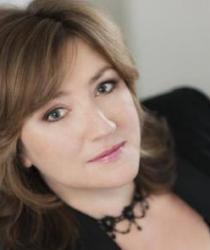
From the moment that the young Lucy Parham sat enraptured at a Royal Festival Hall concert, the course of her professional life became apparent to her. “I remember thinking that one day, I would love to play there myself,” she remembers with vivid clarity. The ambition was duly fulfilled at the age of sixteen, but well before that, one of Britain’s finest pianists of the modern age was already displaying an unusual talent.
By the time she arrived at Bedales, Lucy had come to the attention of the Royal Academy of Music. “One of the great things about the school was that it was one of the few institutions prepared to allow me to zip off to the Royal Academy for the best part of one day each week to learn there,” she explains. “Bedales also let me sneak away to practise my music when I possibly should have been doing other things. Like a lot of Bedalians, I wasn’t particularly sporty, so music was my refuge at a time when I wasn’t especially happy – I wasn’t wild about boarding, to tell the truth – and the school let me get on with what I was good at.”
Music at Bedales was not just about the piano for Lucy. Also an accomplished cellist, she sang in the school choir and remembers the inspirational figure of Jonathan Willcocks with particular warmth. “I was one of a few real musical anoraks at Bedales,” Lucy says self-deprecatingly. “The Williams brothers (Roddy and Conrad) were at the school at the same time as me and they were constantly playing different types of music. I learned from them the whole time and it was they who got me into composers such as Rachmaninov.”
One of the great things about the school was that it was one of the few institutions prepared to allow me to zip off to the Royal Academy for the best part of one day each week to learn there
Lucy left Bedales at the age of 16 and hastily sat her A-Levels at Charterhouse, somewhat closer to the family home. Duty done, she was finally on her way to the Guildhall School of Music, where she studied under Joan Havill. Her profile was immediately boosted by winning the piano section of the BBC Young Musician of the Year, and it has scarcely dimmed since. A regular fixture at the great concert halls of the UK, she has also played with most of the country’s leading orchestras, notably the Royal Philharmonic, with whom she has toured Europe and North America, as well as great overseas names such as the Russian State Symphony Orchestra.
In a profession that is so intensely competitive, therefore, Lucy’s diary appears to be enviably full. It is not something that she takes for granted. “Most of my career has been a lot of hard graft and I always think that being a self-employed musician must be like being a self-employed actor,” reflects Lucy, whose practice schedule alone requires a minimum of six hours a day. “Uncertainty is what can be stressful, so I’d always rather be organised about things than not. On the other hand, I do enjoy the thrill of not knowing precisely what I shall be playing at various points in the future.”
Lucy is often associated with her interpretations of the Romantic composers, particularly Robert and Clara Schumann. Her extraordinarily successful concert, “Beloved Clara”, explored the lives of the Schumanns and Brahms in their own words, through diary extracts, read by the actors Joanna David and Martin Jarvis, and music. This was to provide the template for three subsequent performances of words and music devoted to Liszt, Chopin and Debussy, all of which have been released on CD (see Lucy’s website www.lucyparham.com). The combination of Lucy’s piano and contributions from actors as distinguished as Charles Dance, Dominic West, Juliet Stevenson, Edward Fox and Harriet Walter has proved irresistible to audiences and emphasises Lucy’s own commitment both to music and the written word.
When not chained to her piano, Lucy somehow finds the time to write for BBC Music Magazine, Pianist Magazine and the Guardian and to appear as a broadcast presenter and guest on BBC Radio 3 and 4. She has been called upon to review recordings by her contemporaries and peers on CD Review, a task that she approaches with some caution. “It’s a fine balance as a performer to wear a reviewer’s hat,” she admits. “Nastiness never gets you very far, but at the same time, you can’t just say everything is wonderful, otherwise you defeat the object of the programme. Music changes and tastes change, but I still have to be true to myself.”
Change has been a constant theme in Lucy’s musical life. She particularly notices the differences between the audiences of 20 years ago and those she encounters today. “Quite apart from phones going off, which is the bane of our existence, I do believe that audiences are more fidgety than they used to be,” she suggests. “I can sense whether I have listeners in the palm of my hand or if their attention is wandering and I have a feeling that these days, people find it harder to sit still or concentrate for any length of time. Often, they seem to need their entertainment packaged differently and it is quite depressing that the most important quality in a young female musician today is often her glamour, rather than her talent. Record companies have to take a share of the blame for the dumbing down, but Philistines in Government don’t help and nor does the fact that fewer recitals are covered by the Press. Perhaps it’s a generational thing; people do tend to come to classical music later in their lives, but a Schubert sonata lasts 45 minutes and you need longer than that to appreciate it fully. Making a career through social media is a possibility today and that’s just miles away from the way it was when I was getting started.”
Said with regret rather than anger, Lucy’s jeremiad is cut short as she realises that her career is now entering its fourth decade. “How did that happen?” she laughs. “When I was younger, I had so many ambitions. There are fewer of them now and they’re probably more straightforward. I’d like to play at Carnegie Hall in New York, but more than anything, I want to keep going. If it’s hard to get to the top, it’s a damn sight harder to stay there, and I’d like to continue for as long as possible. Last year, I was incredibly busy, but my schedule was absolutely knackering and it took quite a toll on me. This year, things have been more manageable, which emphasises the need for quality of life, as well as quantity. As long as I’m doing interesting things, I shall be very happy. Music has been my life and I’m still in love with it.”
Lucy Parham was interviewed by James Fairweather in March 2013.
